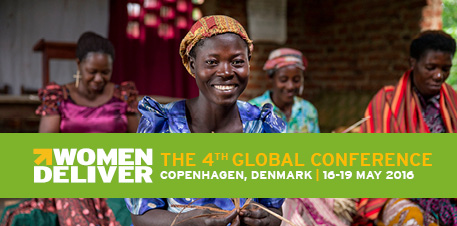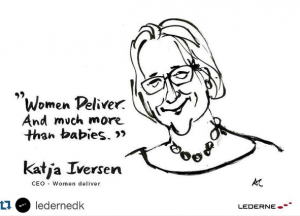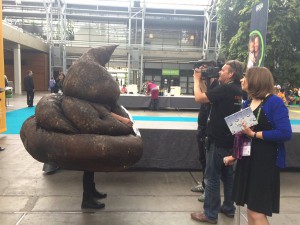Reflections from Women Deliver 2016
May 21, 2016

As Women Deliver 2016 wraps up, I have been reflecting on the meetings, presentations, and conversations that I engaged in this week. I’ve learned from young advocates about the barriers to sanitation they face in countries such as Cameroon; spent time with colleagues from WaterAid dressed in a giant poo costume; and discussed the role of global advocacy days, such as Menstrual Hygiene Day, in policy and awareness raising with WASHUnited. It’s been a busy week! There are some themes that have emerged for me; and, while they are by no means inclusive of my takeaways from the week, they feel significant nonetheless.
At the beginning of the week Melinda Gates made a major commitment of $80 million to “close the data gap,” and the importance of data emerged as a significant theme throughout the conference. In a session on Monday, a panelist said the quote, “If you’re not keeping score, you’re just practicing”. This sentiment stuck with me. We need good data. It is an essential tool to hold countries accountable, determine programmatic success, and ascertain if we are in fact meeting the needs of the hardest to reach. For over two years, the PPPHW has joined with others in the water, sanitation, and hygiene (WASH) sector to advocate for a hygiene indicator in the Sustainable Development Goals (SDGs). The inclusion of this indicator was a huge success, but measuring access to handwashing facilities is not the purview of government alone—non-profits, the private sector, and projects have a role to play as well. Measuring handwashing behavior is difficult, but this toolkit from UNICEF is one resource that can help projects plan monitoring and evaluation efforts.
At the Sanitation and Water for All Ministerial Meeting earlier this year, panelists stressed that political leadership in WASH will be paramount to achieving country-level commitments and the SDGs. This assertion was echoed throughout Women Deliver, and augmented by calls for local-level capacity building, advocacy, and context-specific solutions. I couldn’t agree more. Achieving SDG 6, the so-called Water Goal, will require both a top-down and bottom-up approach. This is one reason that the PPPHW works on advocacy and knowledge leadership. While the former can help foster a WASH-friendly policy environment, the latter helps implementers improve their WASH service delivery and behavior change programing.
WASH was not an official conference track at Women Deliver, but it was prominently mentioned in plenary and concurrent sessions as it underscores success in many of the SDGs, including those for nutrition and health. I already wrote on the topic of integration and the movement to view WASH from a health lens, which is a positive step. However, what I wasn’t expecting was to see such a strong emphasis on menstrual hygiene management, particularly as a component of sexual and reproductive health education. This challenged my own assumptions about integration and encouraged me to think more broadly about the types of organizations and initiatives with whom we should be partnering.
In the opening plenary, Katja Iversen, Women Deliver CEO, said that “Women deliver. And much more than babies.” It’s true. If we hope to deliver the opportunity for health, development, and wellbeing for girls and women across their whole lifespans, we must deliver accessible, appropriate, and sustainable WASH services. The evidence about why we should do so is there, as well as the will. Now, we must back our intentions up with action.
